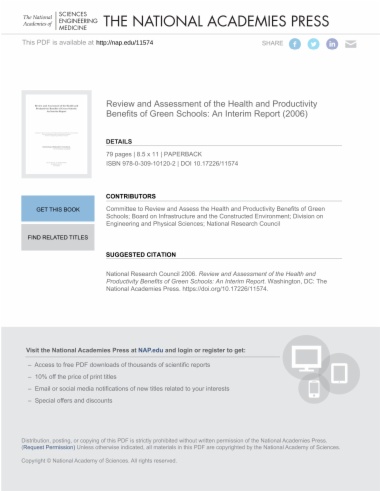Some educational professionals have suggested that so-called green schools would result in superior performance and increased health for students and teachers. While there is no commonly accepted definition of a green school, there are a number of attributes that such schools appear to have: low cost operations, security, healthy and comfortable, and an environment that enhances learning are among them. To determine the health and productivity benefits of green schools, the Massachusetts Technology Collaborative, the Barr and Kendall Foundations, the Connecticut Clean Energy Fund, and the U.S. Green Building Council asked the NRC to examine available studies about the effects of green schools on student learning and teacher productivity. This interim report presents an evaluation of evidence for relationships between various health, learning, and productivity outcomes and five characteristics of green schools: the building envelope, ventilation, lighting, acoustics, and condition. The final report will present evaluations for additional characteristics, a synthesis of the results of all assessments, and promising areas of research.
- Cover
- Front Matter
- Executive Summary
- 1 Introduction
- 2 Building Envelope, Moisture Management, and Health
- 3 Ventilation, Pollutant Source Control, Health, and Performance
- 4 Lighting, Performance, and Health
- 5 Noise, Acoustics, Student Learning, and Teacher Health
- 6 Building Condition and Student Achievement
- References
- Appendix: Biographies of Committee Members
- Role of the Board on Infrastructure and the Constructed Environment

